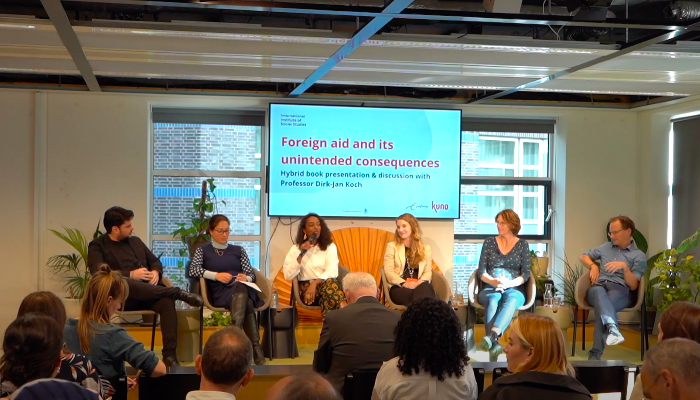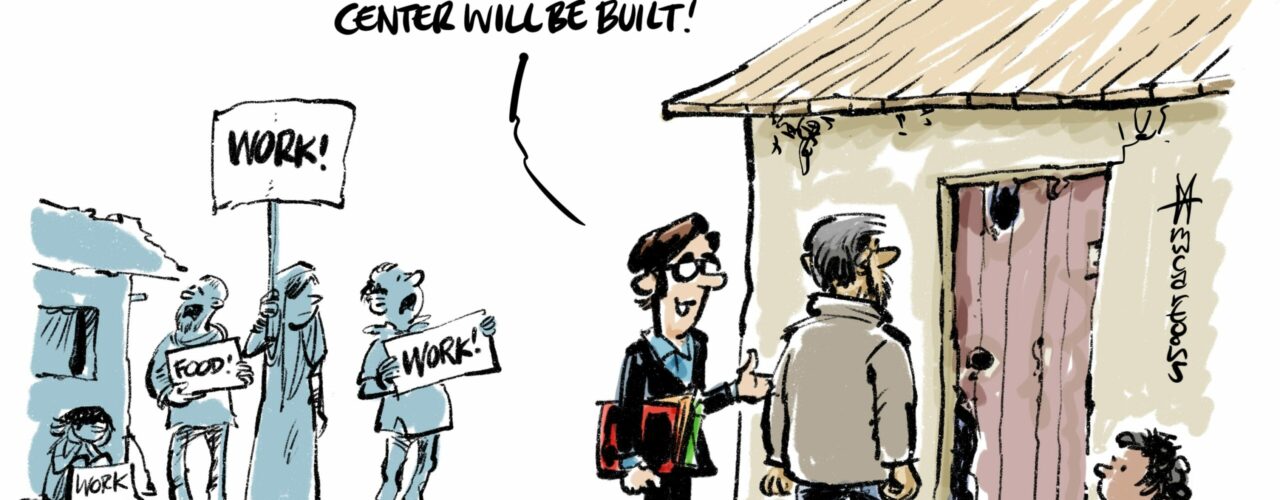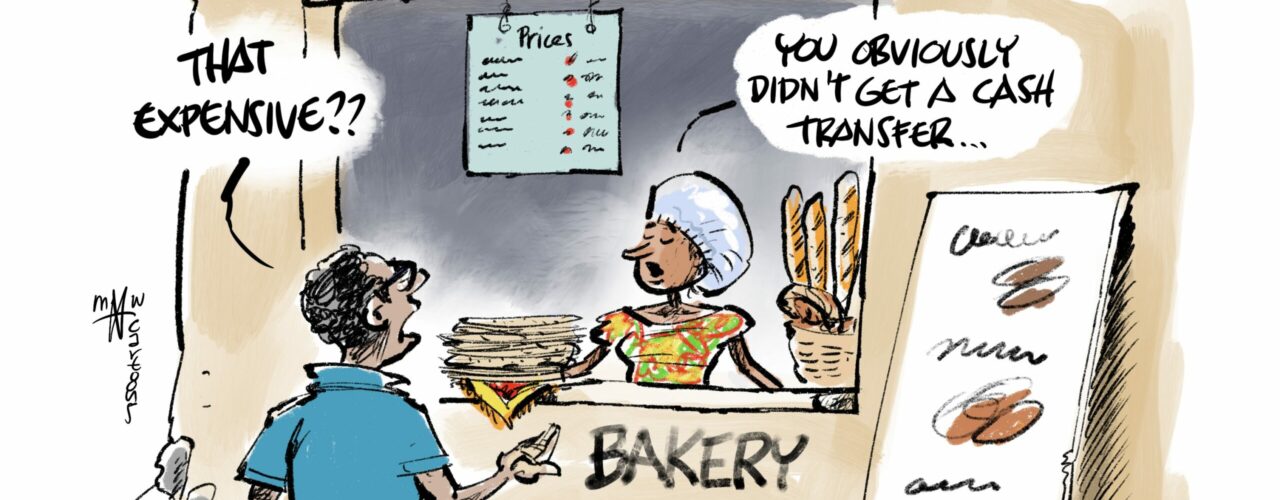Foreign aid and its unintended consequences by Professor Dirk-Jan Koch

This book presentation took place on 5 October, and was facilitated by the International Institute of Social Studies (ISS) and KUNO. The new lens that he presented in his book should lead to new ways of thinking about aid and development and, hopefully, to new ways of working.
Focusing on the humanitarian angle of the book, KUNO invited four speakers from different sectors: academia, policymakers and practitioners, to share their first impressions of the book. In a critical panel discussion they touched upon the following questions: What did I think of the book? Which points did I find most interesting? How do I think we can use this book in our work? Do I have any criticism on the book? And how do they see the impact of what is written in this book?
The book: an introduction by Dirk-Jan Koch
Dirk-Jan Koch began this book presentation by explaining that focusing more on unintended consequences of development and humanitarian aid can be of great significance for three reasons.
Firstly, it would help to stop preventable damage to human lives. As an illustration: consider how aid became a transactional good in some countries in the sense that it was traded for goods and services leading in cases to sexual exploitation and abuse. It was crucial to recognize that this was happening and that the idea of an aid ombudsperson could prevent unintended consequences, or at least draw attention to them (read page 18 and 196 of the book for more information)
Secondly, it could help disentangle dilemmas and pull the emergency brake when needed. This happened, for example, with voluntourism, which had more negative unintended effects than benefits for the host communities. Pulling the emergency brake on this was pivotal.
Lastly, it could finally make the discussion about aid effectiveness and efficiency an honest one in which organisations dare to admit their failures more often. Dirk-Jan Koch emphasised this using the example of overhead costs. In the aid sector, the desire to get the most value for money drives down overhead costs. However, to provide aid properly requires overhead costs and keeping the overhead cost fixed causes unintended consequences to effectiveness and efficiency.
Continuing the presentation, Dirk-Jan Koch unpacked the following five most common myths of unintended effects: unintended effects cannot be anticipated; unintended effects are unavoidable; unintended effects are downplayed; unintended effects are negative; unintended effects are an objective phenomenon.
The unintended effects that Dirk-Jan Koch describes in his book are: the backlash effect, the conflict effect, the migration and resettlement effect, the price effect, the marginalisation effect, the behavioural effect, the governance effect, the negative spill-over effect, the environmental effect, and the ripple effect. The audience was able to vote on the two effects that they were most interested in learning more about throughout the presentation. The audience chose the conflict effect and the governance effect. Do you want to learn more about these specific unintended effects? Read chapter 4 and 10 of the book here.

“Humanitarian disasters will not go away by looking away” - solutions and conclusions by Dirk-Jan Koch
Dirk-Jan Koch ended his presentation by stressing that humanitarian aid should only be provided if the objective is fully humanitarian. In addition, the sector should work to break down boundaries to learning by addressing the ideological boundaries that are existing (e.g., neutrality), by challenging short-term organisational interests, by overcoming institutional boundaries, and by coming up with innovative ways to break down technical boundaries to learning.

As a result of the numerous obstacles and criticism that the humanitarian and development sectors face, they are forced into a crisis and defensive mode. The most logical course of action in this case is either giving up or making safeguards more comprehensive and stricter to reduce risks to zero. However, Dirk-Jan Koch stressed that none of these options are possible nor preferable because humanitarian disasters will not go away by looking away. Instead, he sees a more nuanced and humble third option: encouraging and defending the calculated risk-taking in order to continue effective aid efforts.
Video
“A great writer, but mostly a great teacher” - Thea Hilhorst
The first comment that Thea Hilhorst made, was that she was impressed by how Dirk-Jan Koch was able to include all these different and crucial effects of aid in one book. However, seeing all these unintended consequences of aid made her also wonder “shouldn’t we just stop humanitarian aid?”. The most important thing that stood out to her in the book was how minor changes could have a significant impact. As an illustration, consider how the availability of micro-credit led to an increase in domestic gender-based violence.
In addition, reading about all these unintended consequences, made it apparent for Thea Hilhorst how people use their agency to look away. Therefore, she complimented Dirk-Jan Koch for making the effort to compile all of these unintended consequences in one place. In this way, he motivates the sector to take these consequences into account and to try to make a difference. Considering the future of this book, she urged the need to find a way to concretely translate these lessons learned into practice.
“We are going to keep on failing, but failing on a higher level” – Stijn Janssen
For Stijn Janssen, the book highlighted once again that development is not linear but rather resembles a ‘big bowl of spaghetti’. Rather than trying to untangle it, she concludes that we should just dive into the ‘bowl of spaghetti’. What this concretely means for her is less policymaking here in The Hague and more adaptive programming and relying on the people on the ground, because they probably understand ‘the bowl’ best.
Furthermore, she emphasised that we will continue to fail, but at a higher level, by taking the book’s lessons to heart and applying them in our work. In her reflection, Stijn Janssen underlined that taking calculated risks and being conscious of the degree of risk appetite are important since they will ultimately lead to more effective aid provisioning. Considering the future of this book, she sees many opportunities for research in related fields.
“It was a relief to read that aid is not all doom and gloom” - Suying Lai
Suying Lai very much enjoyed reading the book and especially valued this book as it gives terminology to phenomena humanitarian professionals see happen daily in their work. By giving words to these phenomena, it becomes real and enables us to take action.
Three aspects of the book that Suying Lai found particularly noteworthy were, first, the importance of complexity thinking and designing the organisation for complexity. While adaptive programming remains hard in large organisations, Suying Lai argued that we should begin to think how we can do this, regardless of the organisational size. Furthermore, she was pleased that Dirk-Jan Koch emphasised the value of open and honest conversations in a safe learning environment. KUNO tries to facilitate this, but despite its best intentions, it has proven to be incredibly hard, for instance due to institutional boundaries, donor issues or funding. Lastly, she was relieved to read that with adaptability and collective action, aid does not necessarily have to be negative. An example of successful adaptive programming is the vertical programming for HIV-AID and the horizontal programming for COVID-19.
Suying Lai considered the issue of unintended consequences of policy and the distinction between humanitarian aid and development aid are two topics that could have been covered further in the book.
“A common dictionary for both policy-makers, researchers and practitioners” - John Cruzatti Constantine
John Cruzatti added to the other panellists that he believes it to be a five-star book that covers the most latent and evident discussions in literature. The fact that this book offers a common empirical and theoretical framework that researchers can build upon is for him the most pertinent. Therefore, from a research point of view, Dirk-Jan Koch is likely to receive many citations. In reflecting, John Cruzatti highlighted three aspects of the book that he found most interesting. Firstly, he found the presence of both qualitative and quantitative evidence significant, as this remains uncommon in other literature today. Furthermore, he appreciated Dirk-Jan Koch’s work in creating a common dictionary for policy-makers, researchers and practitioners. At times, it seems as though these groups do not speak the same language in discussions, but this book serves as a sort of cheat sheet on what to expect in conversations with each other. Lastly, he valued that Dirk-Jan Koch did not take the discourse of “Chinese aid is always bad”.
Conversely, John Cruzatti also disagreed with Dirk-Jan Koch on a few points and mentioned some things that Dirk-Jan Koch could discuss in future publications. For instance, he missed the mentioning of specific data that would indicate the extent of the unintended effects. He also wished there would have been written more about the effects of the soft power of aid and how donors interact with one another: the market of aid.
Video
The Q&A
The Q&A that was not included in this summary report can be viewed below.
